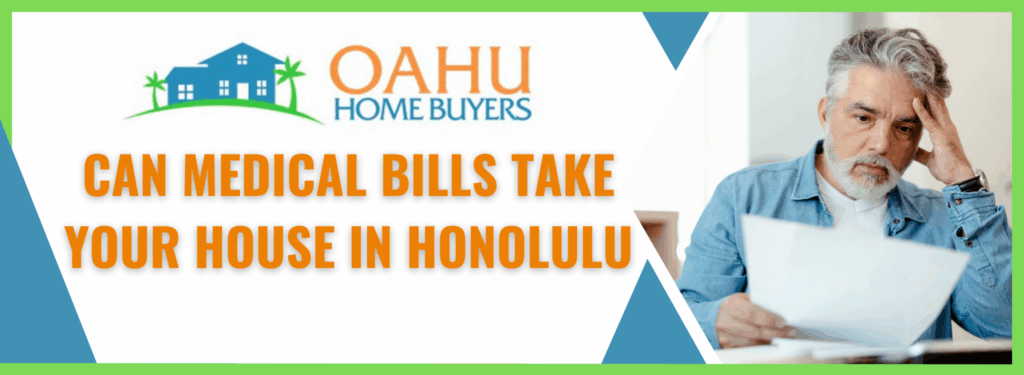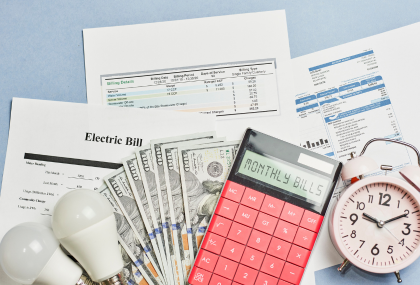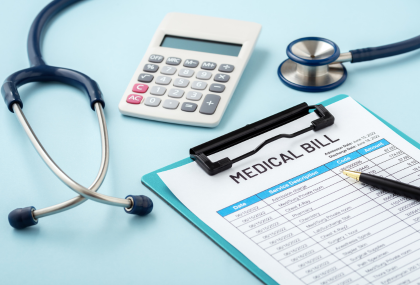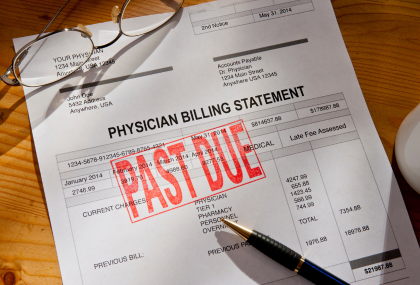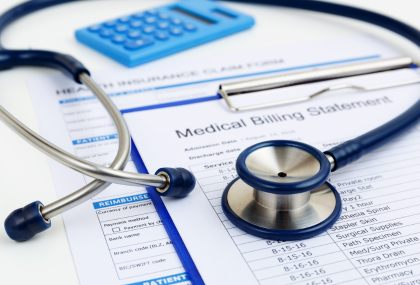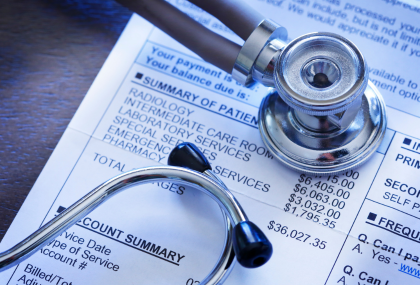Medical Debt: How It Affects Homeownership in Honolulu
Medical debt can have a big influence on homeownership and financial stability, so it is essential for Honolulu homeowners to understand it. Honolulu’s medical costs might be very high, resulting in large bills that could leave you in debt.
This financial strain may compromise one’s capacity to make on-time mortgage payments, raising the possibility of foreclosure. Furthermore, outstanding medical debt frequently hurts credit scores, essential when looking to refinance or get a good mortgage.
Residents prioritize controlling medical debt because of the high cost of healthcare and the particular living expenses related to Honolulu’s real estate market. Protecting your house from the negative consequences of medical debt can be achieved by proactively managing medical costs and requesting assistance through accessible programs.
Understanding these dynamics is essential for maintaining a stable financial position and guaranteeing ongoing homeownership in the face of Honolulu’s rising healthcare costs.
The Impact of Healthcare Costs on Property Ownership in Honolulu
Property ownership is significantly impacted by Honolulu’s growing healthcare expenditures, since many homeowners experience financial difficulty as a result of medical bills. Hawaii residents are finding it more and more difficult to manage their money as the state’s cost of living keeps rising, especially when unforeseen medical expenditures come up.
This financial strain may endanger their homes as people try to juggle their mortgage payments and growing medical debt. Sometimes families must choose between keeping up their home payments and paying for necessary medical care.
Homeowners in Honolulu must be mindful of the possible hazards connected to medical bills because the possibility of losing their house as a result of unpaid medical debt is becoming increasingly real. Protecting homeownership in this financially demanding environment requires understanding the complex relationship between medical expenses and property security.
The Connection Between High Healthcare Costs and Housing Stability in Honolulu
Since medical debt is becoming a major issue for many Honolulu residents, the city’s high healthcare costs can substantially impact home stability. Unexpected medical bills might cause financial strain that puts the ability to pay rent or a mortgage at risk in a city with high living expenses.
Due to Hawaii’s distinct geographic and economic characteristics, which raise healthcare expenses and restrict access to cheap housing, this financial strain is made worse. As healthcare costs grow, families and individuals may have to decide between keeping a secure home and paying for essential medical treatments.
This tough choice frequently leads to postponed medical care or significant debt accumulation jeopardizing long-term financial stability. Additionally, the strain of dealing with crippling medical bills can have a cascading impact, lowering general quality of life and raising the likelihood of homelessness among Honolulu’s most vulnerable groups.
Financial Planning Tips for Managing Healthcare Costs in Honolulu
Strategic financial preparation is necessary for efficient healthcare expense management in Honolulu to shield your household from the effects of medical debt. Knowing what your health insurance covers is essential because it helps you plan your budget and foresee out-of-pocket costs.
To pick a plan that best meets their needs, residents should investigate the several Honolulu health insurance options available, comparing network providers, deductibles, and rates. A financial safety net can also be established by setting up a special emergency fund for unforeseen medical expenses.
This fund is regularly reviewed and updated to ensure it continues to be sufficient to pay future medical costs. Negotiating payment schedules or discounts with healthcare providers might also reduce immediate financial strains.
You can lower your taxable income and save for future medical costs by using Flexible Spending Accounts (FSAs) or Health Savings Accounts (HSAs) to set aside pre-tax money for medical bills. Working with neighborhood financial advisors who are familiar with the particulars of Honolulu’s healthcare system will help you better control expenses and avoid placing an excessive strain on your household budget.
Navigating Health Insurance Options to Safeguard Your Assets in Honolulu
Understanding your Honolulu health insurance alternatives is essential for preserving your assets, especially when defending your house from medical debt. By being aware of the nuances of different health insurance policies, you may select a policy that best suits your needs and provides sufficient coverage.
A safety net against unanticipated medical costs can be obtained by considering options such as government programs like Medicaid or Medicare, private individual policies, and employer-sponsored health insurance. When choosing a plan, it’s critical to consider variables such as monthly premiums, deductibles, copayments, and out-of-pocket maximums.
Assessing network limits is crucial to guaranteeing access to Honolulu’s preferred healthcare providers. Supplemental plans that fill in the gaps in ordinary insurance can further strengthen your financial security.
Awareness of open enrollment periods and any modifications to Hawaii-specific health insurance laws will enable you to make choices that safeguard your financial security and well-being. At Oahu Home Buyers, we buy houses for cash in as-is condition, including houses with pending lawsuits in Honolulu. You can read our reviews and learn about how we buy houses.
Strategies to Prevent Losing Your Home Due to Medical Bills in Hawaii
To safeguard your Honolulu property from the threat of medical debt, it’s critical to take preemptive measures adapted to Hawaii’s particular financial situation. Start by being aware of and taking advantage of state-specific health insurance choices, which can drastically lower out-of-pocket costs and lower the chance of accruing excessive medical debt.
Learn about Hawaii’s Prepaid Health Care Act, which provides a safety net against unforeseen medical expenses by requiring employers to give health insurance coverage to qualified employees. Additionally, ensure you have a safety net in case of unanticipated medical crises by actively managing and budgeting your money, allocating an emergency fund for medical bills.
To lessen the immediate financial strain of large bills, have open discussions with healthcare providers and bargain for payment arrangements or discounts up front. Examining Hawaii’s government assistance programs can also help; if you qualify, Medicaid and other local resources may pay for a sizable percentage of your medical expenses.
Finally, consider working with a financial advisor familiar with Hawaii’s healthcare and real estate markets to create a thorough plan to protect your house and financial security from potential medical debt traps.
Steps to Take When Facing Medical Debt Threatening Your Home in Hawaii
When medical debt threatens your Honolulu property, it’s critical to take prompt, calculated action to safeguard your assets. To avoid inflating your debt, start by carefully checking all medical bills and insurance documents for errors or anomalies.
Speaking with a financial counselor knowledgeable about the specifics of Hawaii legislation can help you manage and negotiate your medical obligations. Another way to ease immediate financial strain is to speak with healthcare providers directly about possible reductions or payment options.
Examining Hawaii-specific government aid programs could provide relief for locals with excessive medical costs. Additionally, as you negotiate debt repayment plans, knowing Hawaii’s homestead protection laws can guarantee that your principal residence is protected from creditors. We buy houses all over Hawaii—from Honolulu and Kailua to Pearl City, Waipahu, Kaneohe, and surrounding areas.
Legal Protections Against Medical Debt for Hawaii Residents
Several legal provisions protect Hawaii residents from medical debt. The state has passed special regulations restricting aggressive collection techniques to ensure that healthcare providers and debt collectors follow fair treatment norms.
Some solace for those concerned about harassment comes from Hawaii law, which forbids creditors from employing dishonest tactics to recover medical bills. Hawaii also abides by federal protections, including the Fair Debt Collection Practices Act (FDCPA), which establishes consumer rights and regulates the collection of debts, thereby offering further protection.
Understanding these legal protections is essential for Honolulu homeowners who are dealing with excessive medical costs since it can avoid needless financial pressure and maintain home ownership. Additionally, Hawaii provides a number of aid initiatives aimed at helping citizens efficiently manage their medical expenses, which may lower the likelihood of accruing excessive medical debt.
People can more confidently negotiate the difficulties presented by medical costs if they are aware of these safeguards and make use of the available services.
Comparing State Laws: How Hawaii Protects Homeowners From Medical Creditors
Residents must be aware of these state-specific legislations since Hawaii provides homes with special protections against medical creditors. Hawaii’s laws offer a safety net that helps protect its citizens’ home equity, unlike other jurisdictions where medical debt can result in aggressive collection tactics.
Particularly noteworthy is the state’s homestead exemption, which enables homeowners to protect a sizeable amount of the value of their property from creditors pursuing payment of medical expenses. This exemption is essential to preventing a family’s primary house from being threatened by medical financial difficulties.
Furthermore, Hawaii law requires creditors to adhere to certain standards before starting foreclosure actions pertaining to unpaid medical expenses. These rules, which demand openness and give customers ways to bargain or contest fees, can prevent unfair property loss caused by the accumulation of medical debt.
Legal Advice for Homeowners Dealing with Overwhelming Medical Debt in Hawaii
Navigating the nuances of crippling medical debt in Hawaii can be especially difficult for Honolulu homeowners. To save your property from the financial burden that medical debt can place on it, it is essential to be aware of your legal rights and options.
A crucial first step is speaking with an experienced lawyer who focuses on debt relief and consumer protection. They can advise how state rules, such as Hawaii’s homestead exemption, may protect your principal residence from creditors.
Since these regulations frequently restrict the amount creditors can take from your home equity, knowing its subtleties might ease your mind. Medical bills may also be easier to manage if you look into options like working out payment arrangements with healthcare providers or filing for bankruptcy as a last resort.
Understanding the Statute of Limitations on Medical Debt Collection in Honolulu
Protecting your Honolulu home from the financial burden of unpaid medical bills requires an understanding of the statute of limitations on medical debt collection. Hawaii has a six-year statute of limitations for medical debt collection.
This implies that you have six years from the date of your last payment or acknowledgement of the debt for creditors and collection agencies to sue you to get the money you owe. Knowing this schedule can help you better handle possible legal actions and engage in creditor negotiations.
Maintaining a record of all correspondence and payments pertaining to your medical debts is critical because any recent activity may cause this statute to reset, extending the time frame for legal action by creditors. By being aware of these regulations, residents of Honolulu can better protect their homes and personal finances from aggressive debt collection operations and ensure they are not unfairly singled out once the law ends.
The Effects of Unpaid Medical Bills on Credit Scores and Property Ownership
Unpaid medical costs can have a significant effect on your credit score and, in turn, your ability to continue owning real estate in Honolulu. A worse credit score results from medical debt that is not paid, as it may be reported to credit bureaus by healthcare providers or collection agencies.
Homeowners may experience more financial burden if they cannot refinance their existing house loans or obtain advantageous terms on new mortgages due to a lower credit score. Furthermore, liens against your property may be imposed if medical bills escalate to the point that creditors take legal action.
These liens reduce your home’s equity value and make the selling more difficult. Therefore, in Honolulu’s competitive real estate market, timely management of medical bills is essential for protecting both your homeownership status and credit standing.
Foreclosure Process Due to Unpaid Healthcare Debts
For homeowners in Honolulu, the foreclosure process brought on by unpaid medical bills can be a frightening one. Medical bills that are not paid may eventually be sold to collection agencies, which have the authority to sue homeowners.
If these obligations are not properly managed, in certain situations, this may result in liens being put on properties and, eventually, foreclosure. For those struggling with medical debt, it is essential to comprehend the foreclosure process.
Usually, after a lien is placed, creditors can start the foreclosure process to sell the property at auction and recoup the money owing. It is important for homeowners to know that there are legal safeguards and ways to keep their houses from being taken away because of unpaid medical bills.
To navigate this complicated scenario, it can be helpful to seek advice from financial consultants or legal professionals specializing in medical debt and foreclosure. Additionally, looking into alternatives like registering for charity care programs or arranging payment arrangements with healthcare providers could help lessen some of the financial strain before it worsens and becomes a foreclosure problem in Honolulu.
Financial Assistance Programs for Medical Expenses in Hawaii
Medical debt management in Honolulu can be difficult, but Hawaii offers several financial aid options to lessen the strain. To lower out-of-pocket medical costs, residents might look into programs like the Hawaii Med-QUEST Division, which offers Medicaid coverage to qualified individuals and families.
Several nearby hospitals and healthcare providers also offer financial aid programs that help with outstanding debts or offer sliding-scale payment plans based on income. The Healthcare Association of Hawaii also provides information and advice on enrolling in state-sponsored health insurance plans and charitable care initiatives.
Honolulu’s nonprofits frequently work with community health centers to provide free or inexpensive treatments, guaranteeing that locals may get the care they need without breaking the bank. Protecting your house from the possible financial strain brought on by unforeseen medical bills requires that you are aware of these resources.
Government Assistance Programs for Healthcare Costs in Hawaii
Understanding the several choices available to shield your Honolulu home from potential medical debt is essential while assessing government aid programs for healthcare expenditures in Hawaii. For qualified low-income individuals, Medicaid, also referred to locally as Med-QUEST, provides complete coverage, offering crucial assistance for medical costs that could otherwise strain finances.
Another helpful tool is the Hawaii Health Connector, which assists people and families in locating appropriate health insurance plans with potential subsidies to lower premiums and out-of-pocket expenses. Furthermore, children in households that make too much money for Medicaid but cannot afford private insurance are covered under the Children’s Health Insurance Program (CHIP).
By being aware of these programs, you may protect your financial stability and considerably lessen the burden of medical bills. It’s crucial to carefully read these instructions because access to these resources necessitates fulfilling certain eligibility restrictions, such as income limits and residency requirements.
Community Resources for Handling Health-related Financial Crises in Hawaii
Because of the high expense of living and healthcare in Hawaii, managing medical debt can be especially difficult in Honolulu. Fortunately, residents experiencing financial difficulties connected to their health can get help from various community options.
Agencies like the Hawai‘i State Department of Health offer direction and assistance when handling medical bills and insurance claims. Local non-profits such as Helping Hands Hawai’i also provide financial counseling services to help people comprehend their debts and make sustainable repayment schedules.
Another helpful resource is the Legal Aid Society of Hawai‘i, which offers free legal aid to qualified individuals. This ensures that locals are aware of their rights when interacting with creditors or contesting false charges. Community health clinics on Oahu also play a vital role in relieving families of the financial burden of medical bills by providing sliding-scale or inexpensive healthcare services.
Additionally, programs like the Aloha United Way help people identify long-term financial stability solutions while connecting them with options for emergency financial aid. By utilizing these community tools, residents can better safeguard themselves against the crippling effects of medical debt.
How to Negotiate with Hospitals and Providers Over Medical Bills in Honolulu
Negotiating with Honolulu’s hospitals and healthcare providers is one of the most critical steps in managing and lowering medical debt. To start, thoroughly go over your medical bills to make sure there are no mistakes or unforeseen fees.
After you’ve checked the statement, contact the hospital’s or provider’s billing department to discuss your financial circumstances and look into possible payment plans or discounts. Several Honolulu hospitals provide financial aid programs that can drastically lower your medical costs, particularly if you can prove that you are struggling financially.
Being upfront and truthful about your financial situation is crucial since it may result in better conditions. Additionally, think about consulting with Hawaii-based consumer advocacy organizations, as they might offer resources and assistance during the negotiating process.
By being aware of the billing procedure and proactive in contacting your healthcare provider, you can effectively negotiate and shield your Honolulu home from crippling medical debt.
| STATE OF HAWAII | COLLECTION AGENCY | SUED | SUING | COURT | COMPLAINT |
| JUDGMENT | INCOMES | CONSUMER CREDIT | WAGE | SMALL CLAIMS COURTS | SMALL CLAIMS |
| CREDIT CARD | LAWYER | WELLNESS | CONTRACT | DEBT SETTLEMENT | U.S. |
| THE UNITED STATES | UNITED STATES | MEDICAL CENTERS | MONEY | INFORMATION | FEDERAL TRADE COMMISSION |
| FTC | THE FEDERAL TRADE COMMISSION (FTC) | PERSONAL LOAN | REASONS | POVERTY | HONOLULU, HI |
| BORROWERS | DEBTORS | CREDIT COUNSELING | BANK ACCOUNT |
Helpful Honolulu Blog Articles
- Understanding Hospital Liens On Property In Honolulu, HI
- Guide To Selling Your House To A Developer in Honolulu, HI
- Can Medical Bills Take Your House in Honolulu, HI
- Selling A House With A Pending Lawsuit In Honolulu, HI
- Free Things to Do in Honolulu, HI
- Honolulu, HI, Neighborhood Map
- Fun Facts About Honolulu, HI
- Honolulu, HI, Cost of Living
- Honolulu, HI, Closing Costs Calculator
- Is Honolulu, HI, A Good Place to Live
- Honolulu, HI, Capital Gains Tax Calculator & Tax Planning Strategies
- Best and Worst Neighborhoods in Honolulu, HI
- Best Honolulu, HI, Property Managers



